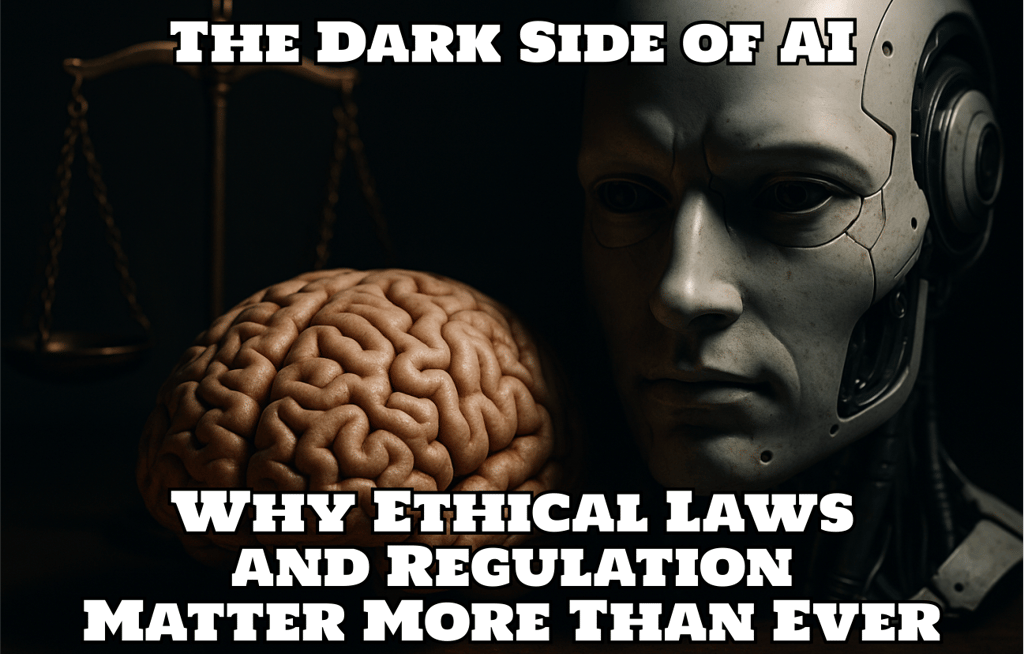The Dark Side of AI: Why Ethical Laws and Regulation Matter More Than Ever
As AI transforms healthcare, finance, law enforcement, and daily life, ethical oversight is critical. From the EU AI Act to U.S. executive orders and China’s AI laws, global governments are racing to regulate AI’s impact. Key principles like transparency, accountability, fairness, and privacy are driving AI legislation and policy debates worldwide. Real-world cases, from biased hiring tools to deepfake blackmail, reveal why responsible AI governance matters now more than ever. Discover how these regulations shape AI’s future and why ethical innovation is no longer optional. Stay informed and ahead of the curve. #AIEthics #AIRegulation #ResponsibleAI
ARTIFICIAL INTELLIGENCE
Toz Ali
5/24/20253 min read


Why AI Legislation and Ethics Matter
As artificial intelligence (AI) becomes deeply integrated into our everyday lives—from healthcare and finance to education, law enforcement, and smart devices—its societal influence has reached unprecedented levels. With this influence comes a vital need for robust AI governance to answer key questions:
How do we regulate AI?
Who is responsible when AI fails?
How do we protect fundamental human rights?
These questions are driving governments, industry leaders, and civil society to create frameworks that ensure AI is deployed responsibly, ethically, and safely.
Global Push for AI Legislation
1. The EU AI Act (2025)
The European Union's AI Act is the world's first comprehensive AI regulation and sets a global benchmark. It categorizes AI systems by risk:
Unacceptable risk: Banned entirely (e.g., social scoring systems by governments).
High risk: Strictly regulated (e.g., biometric surveillance, hiring tools).
Limited and minimal risk: Subject to fewer rules.
The Act mandates conformity assessments and imposes significant fines for non-compliance, ensuring high-risk AI is transparent, accurate, and includes human oversight.
2. The U.S. Executive Order on AI (2023–2025)
While the U.S. lacks a single federal AI law, President Biden's 2023 executive order introduced key requirements:
Mandatory safety testing and audits for AI models.
Watermarking for AI-generated content.
Federal agencies like NIST and the FTC are developing frameworks for fairness, accountability, and transparency. Meanwhile, states such as California are leading with their own AI legislation.
3. UK and Other Nations
UK: The UK favors a "pro-innovation" strategy through its 2023 AI White Paper, promoting sector-specific guidelines.
China: China's AI laws prioritize national security and content moderation, requiring companies to register generative AI models.
Core Ethical Principles in AI
1. Transparency - Users and regulators must understand how AI decisions are made.
AI Misdiagnosis in Cancer Detection
An AI tool named Mia, tested by the UK's National Health Service (NHS), successfully identified early signs of breast cancer in 11 women that human doctors had missed. While this showcases AI's potential, it also underscores the importance of transparency. Without clear understanding of how AI reaches its conclusions, medical professionals may struggle to trust or verify its recommendations, potentially leading to missed diagnoses or unnecessary treatments.
2. Accountability - Definition: Clear responsibility must be assigned for AI-driven actions.
Tesla's Full Self-Driving (FSD) System Runs a Red Light
In a comparative test between Tesla's FSD system and Waymo's robotaxi, Tesla's vehicle ran a red light, a critical error that would result in failing a driver's test. Such incidents raise questions about accountability: if an autonomous vehicle causes an accident, who is responsible—the manufacturer, the software developer, or another party?
3. Fairness and Non-Discrimination - AI must not amplify biases or treat individuals unequally.
Amazon's AI Recruiting Tool Exhibits Gender Bias
Amazon developed an AI recruiting tool to streamline hiring processes. However, the tool was found to favor male candidates over equally qualified female applicants, as it was trained on resumes submitted over a 10-year period, predominantly from men. This led to the system downgrading resumes that included the word "women's," such as in "women's chess club captain." Amazon discontinued the tool after discovering these biases.
4. Privacy and Data Protection - AI must respect privacy laws and individual data rights.
Robert Williams Wrongfully Arrested Due to Facial Recognition Error
In 2020, Robert Williams, a Black man from Michigan, was wrongfully arrested after facial recognition software incorrectly identified him as a suspect in a theft case. The technology matched his driver's license photo to surveillance footage, leading to his arrest and detention. This incident highlights concerns about privacy, data protection, and the potential for AI to perpetuate racial biases.
5. Beneficence and Non-Maleficence - AI should do good and avoid harm to individuals or society.
Deepfake Technology Used for Blackmail
In 2023, the FBI reported an increase in cases where malicious actors used AI-generated deepfake images and videos to blackmail individuals, including minors. These deepfakes often involved non-consensual explicit content, leading to emotional distress and reputational damage for the victims. Such misuse of AI underscores the necessity of ensuring technologies are designed and deployed to do good and avoid harm.
Final Thoughts
The integration of ethical principles into AI development is not just ideal—it's essential. With strong legislative frameworks like the EU AI Act, ongoing efforts by the U.S. government, and a growing global consensus, the world is taking bold steps to ensure AI remains a force for good.
For innovators, developers, and policymakers, staying informed and aligned with these principles is crucial for shaping a trustworthy, inclusive, and fair AI-powered future.
Want to stay ahead on AI regulation and ethics? Subscribe to our blog or follow us for weekly updates!
